How to make a ladder with your own hands?
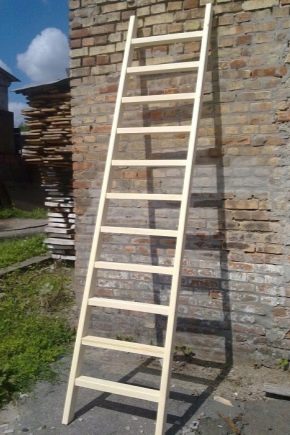
An extension ladder is a functional element consisting of two longitudinal parts connected by horizontal crossbars, called steps. The latter are supporting, reinforcing elements that ensure the integrity of the entire structure. Is it possible to make a ladder with your own hands.
Peculiarities
Materials, from which a ladder can be made:
- wood;
- iron;
- plastic.
The height of the tie that a ladder can provide depends on the ratio of the length of its vertical supports and the load factor that these supports can withstand. A ladder is a portable communication object, which makes it possible to use it in special conditions: during construction work, in household and other similar situations. The constructive nature of this device allows you to make it yourself, if necessary.
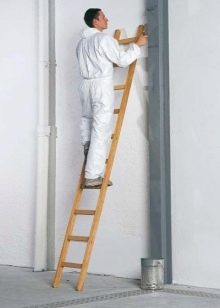
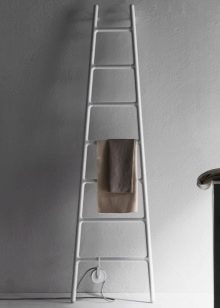
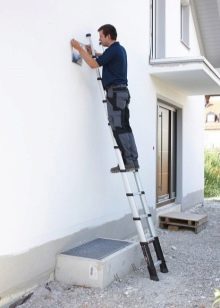
Advantages
The main feature of an adjustable ladder is its mobility. The simplicity of its design allows movement in all available directions. In most cases, one person can carry it. Such a ladder is used for its intended purpose in those situations in which it is not possible to use other methods of support and communication: ladders, scaffolding, and others. An extension ladder fulfills its intended function in the presence of minimum conditions. Only two upper points of support are required for the vertical parts of its frame and two lower ones.
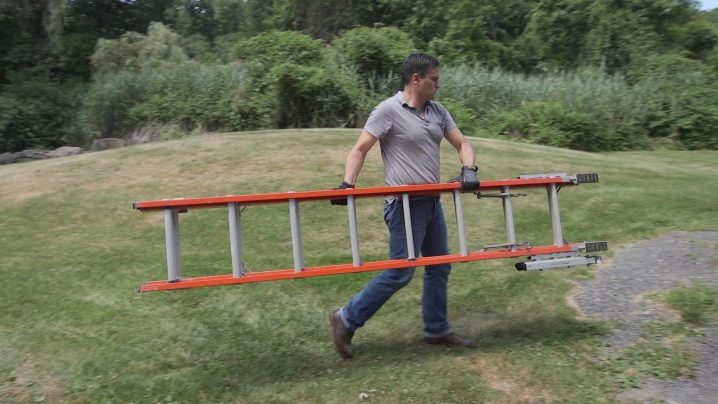
Instruments
The set of tools required for self-assembly of a ladder is determined by the type of its design and the properties of the material used for its manufacture.
Wooden modification:
- sawing tool (hacksaw, jigsaw, miter saw);
- screwdriver with attachments (drills, bits);
- wood chisel;
- hammer.
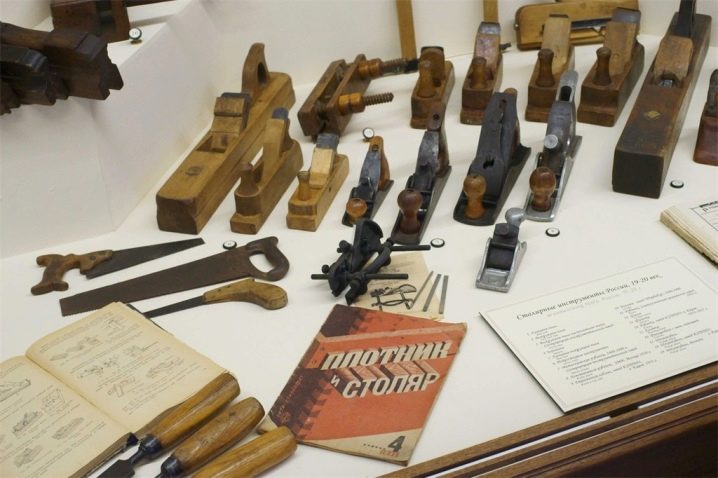
Metallic option:
- angle grinder with cut-off wheel;
- welding machine (if necessary);
- drill with drills for metal.
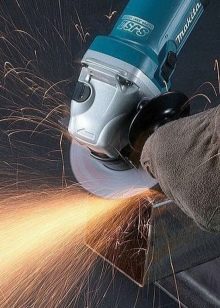
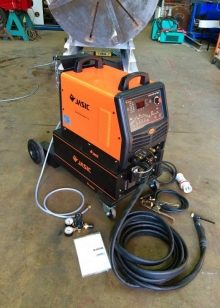
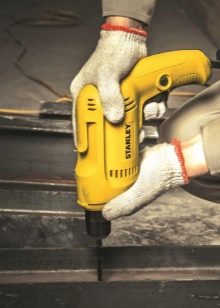
PVC assembly materials:
- soldering iron for polypropylene pipes (PP);
- pipe cutters (scissors for cutting PP pipes);
- related tools.
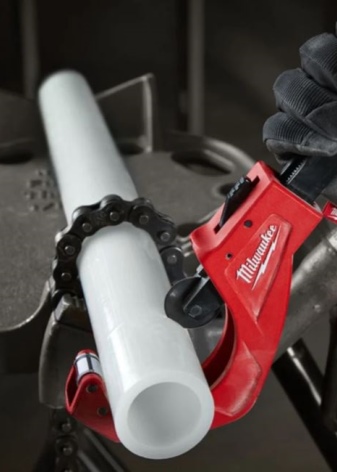
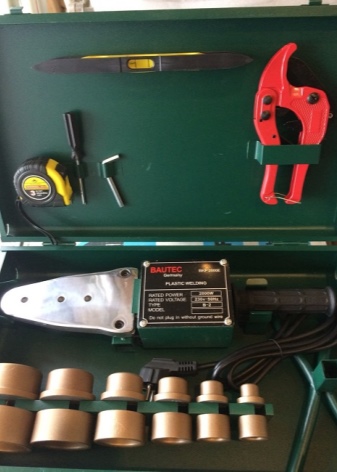
When choosing a particular way of making a staircase, you will need measuring and marking devices:
- roulette;
- square;
- marker, pencil.
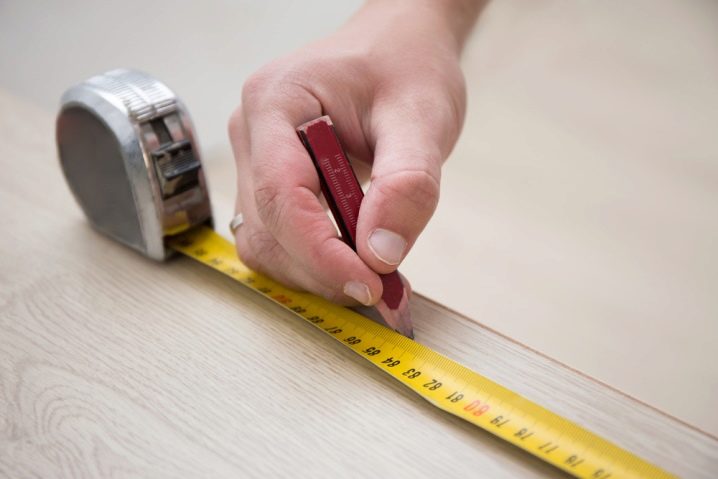
Consumables, depending on the type of stairs:
- self-tapping screws for wood (the size is selected individually);
- bolts, nuts, washers;
- electrodes;
- PP corners, connectors, plugs.
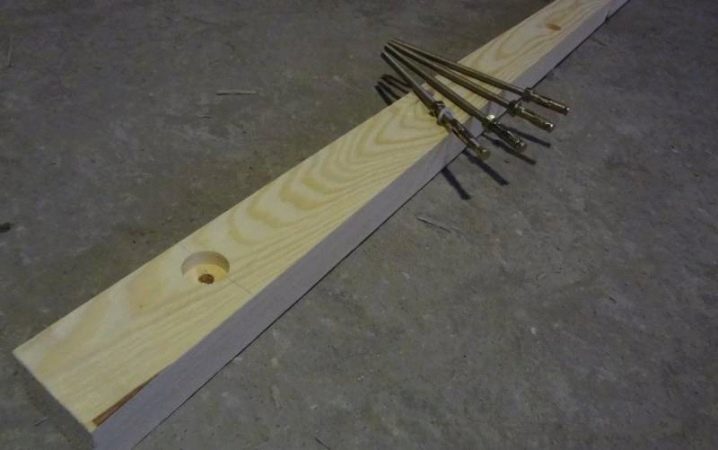
How to make?
Made of wood
Prepare 4 boards with parameters: 100x2.5xL mm (D is the length corresponding to the height of the future staircase). Prepare the required number of cross bars at the rate of 1 piece for every 50 cm. The length of each cross member should not exceed 70 cm. Place two vertical boards strictly parallel on a flat surface. Lay out the prepared strips - steps on top of them at an equal distance. The ends of the planks should match the edges of the boards. The angle between vertical and horizontal elements must be 90 degrees.
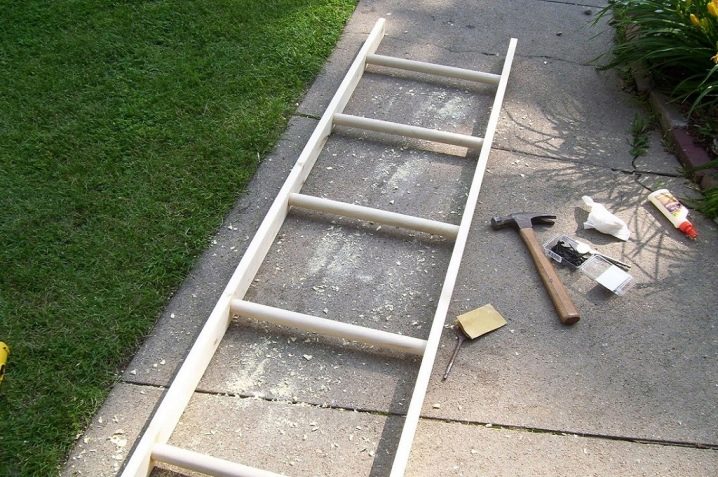
Carefully, so as not to displace the resulting structure, lay the remaining 2 boards in the same way as the first 2 were laid. You should get a "two-layer staircase". Check again the correspondence of the angle between the parts. Using self-tapping screws, fix the strips located between the two boards at their points of contact.In order for the blanks not to crack from screwing in the self-tapping screws, it is necessary to drill a landing hole for them. For this, a drill with a diameter not exceeding the diameter of a self-tapping screw is used. At each point of contact of the planks, at least 2 screws are screwed on each side of the ladder.
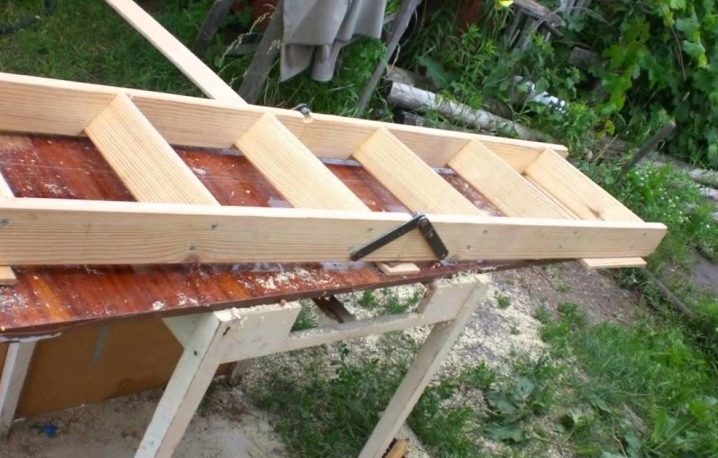
This type of ladder is one of the most practical. Its design allows assembling a coupling device of almost any length and easily withstands the maximum permissible loads. For manufacturing, improvised building materials can be used, which can be used for other purposes after dismantling. There is no need to make any cuts, stops for the step strips and other additional manipulations.
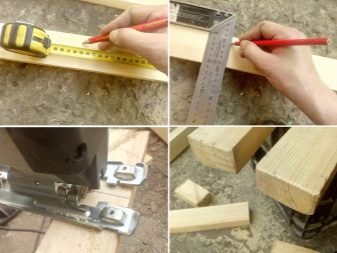
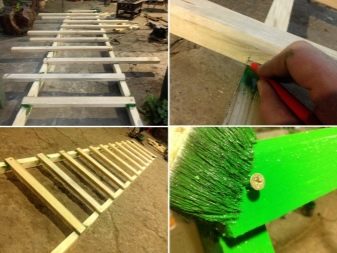
Important! In order to make an attached wooden ladder with your own hands, you need to select materials that do not have structural damage: knots, cracks, cuts and others. It is not recommended to connect two ladders of this type to each other.
Made of metal
For the manufacture of the structure, you can use a profile pipe of square or rectangular cross-section, however, the second option has indisputable advantages over the first. Such a ladder can have several modifications. In the first version, 2 vertical supports of a rectangular profile are interconnected by strips of the same material. In this case, the strips are attached to the supports from the inside of the latter. In the second version, the steps are attached to the vertical parts on top of them. To facilitate the structure, a pipe of a smaller diameter can be used as transverse strips.
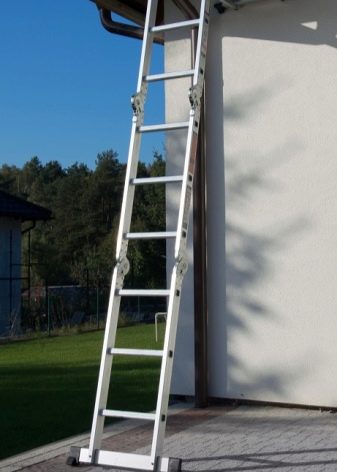
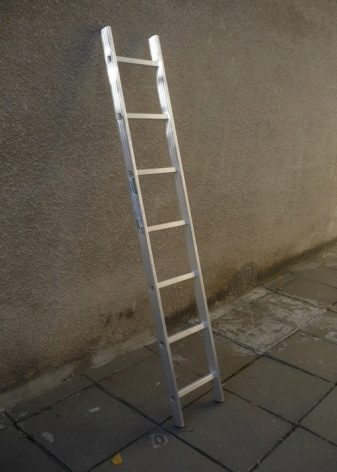
By analogy with a wooden staircase, a metal one is assembled by connecting horizontal strips with vertical supports. With the help of a welding inverter, the workpieces are welded together. Particular attention is paid to the angle between the parts and the strength of the weld. The quality of these characteristics determines the degree of safety when using the device.
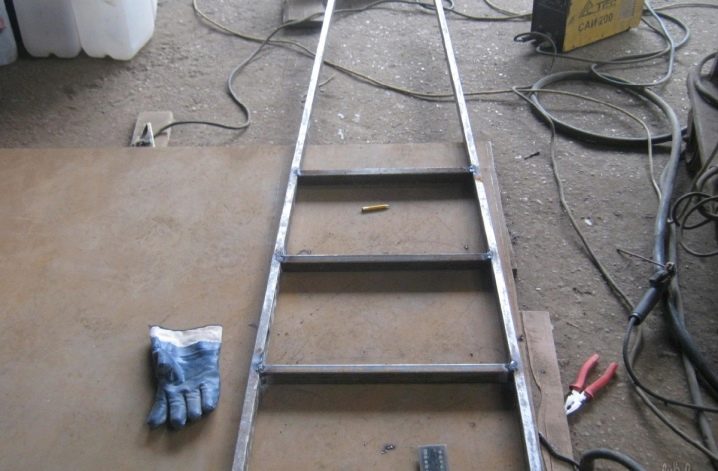
The properties of the metal structure make it possible to equip the ladder with hooks, which can hold it in the desired position, with a support platform for the legs. The latter can be movable in height. To implement such a modification of the platform, its fasteners are made, based on bolted connections, allowing it to be fixed at the desired level.
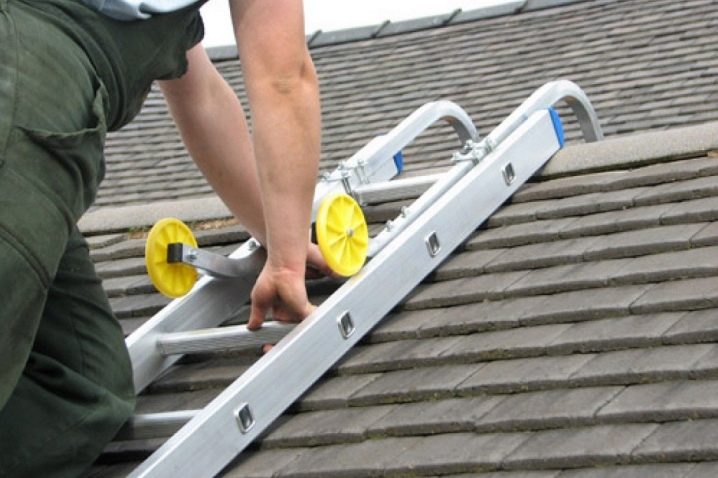
PVC pipes
This method of making a staircase is the most impractical. Its features are: high cost of materials, low structural strength, and assembly complexity. To make a staircase from PVC pipes, it is necessary to use the latter with an inner diameter of at least 32 mm. It is desirable that they have an internal reinforcement with a metal or a temperature-resistant layer. Connections of vertical supports with horizontal steps are carried out using PVC tees.
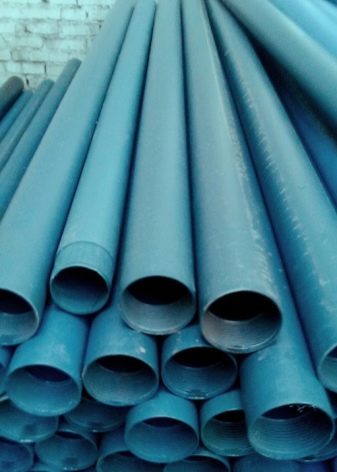
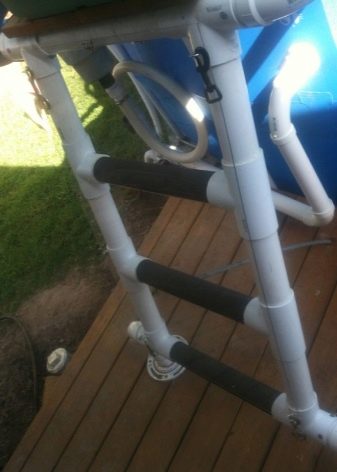
For the safest use of a ladder made of PVC pipes, its height should not exceed 2 m. Otherwise, when exposed to a working load, it may undergo structural deformation, which can threaten the life and health of the one who uses it.
In the manufacture of a staircase from a particular material, the design drawing plays an important role. It will provide the best quality assembly.
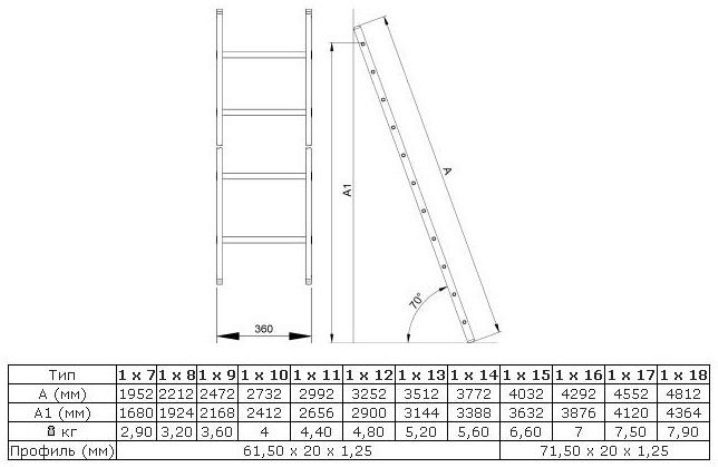
Operating rules
An extension ladder is a device that requires increased care during operation. The support for its top point must be stable and solid. The bottom point of the ladder should only be installed on firm and level surfaces. Application on soft, slippery, sandy ground is not allowed.
The angle between the base of the ladder and the point of its upper support should be optimal. The structure should not tip over backwards under the weight of a person, and its lower part should not move away from the support.It is unacceptable to get up on the last 3 steps of the ladder if its design does not provide for a footrest, staging platform or other fixing fixtures.
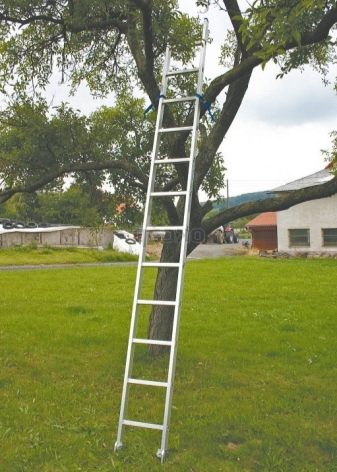
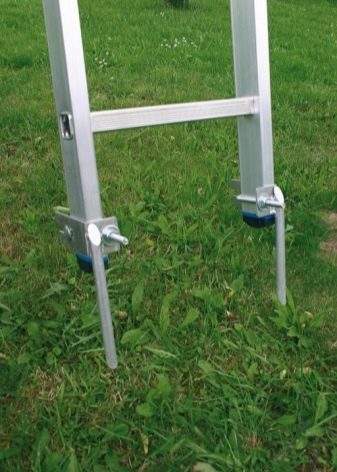
You can see how to make an extension ladder in the next video.













The comment was sent successfully.